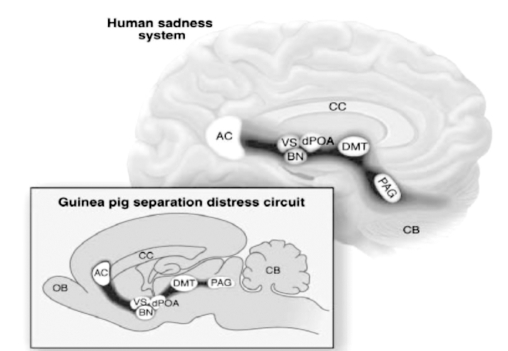siti
Well-Known Member
In another thread this off-topic topic came up. Of course we do not see animals performing elaborate funeral rites as humans do but these are really just well-developed community-, language- and technology-based responses to death that we would expect to observe in humans much more than other animals. This is a point that anthropologist Barbara King makes in her 2013 book How Animals Grieve. Here is her own precis of the book from Animal Sentience 2016.004.
King looks at the question from a behavioral point of view and finds plenty of evidence of 'mourning' and 'grief' in the animal world. But is there also a deeper, more fundamental way in which grief and separation or bereavement anxiety are felt similarly in animals as well as humans? This 2008 study found that a particular neurotransmitter - corticotropin-releasing factor (CRF) - was present at elevated levels in prairie voles when separated from their mates and accompanied by stress-coping behavioral responses which suggests that the loss of the partner was "aversive" to the voles just as we know it is for humans.
And here is another study that found, according to the abstract,
These "emotional feelings" include the grief response - and the key point is that they are "functionally homologous" and involve the "primitive subcortical regions of the brain" in all mammals that have been studied. That is to say that the same neurotransmitters light up the same parts of the brain in other animals as they do in humans in response to grief. For example, the paper gives a pictorial comparison of the "sadness" circuits in the human and guinea pig brains:

The author of both of these papers both make the point that understanding animal grief is important from a scientific and medical point of view because if we can understand the mechanism by which these emotional 'tools' (such as grief and anxiety) bequeathed to us by our evolutionary ancestors really work, we have a safe means of developing new ways to alleviate the sometimes debilitating burden of grief.
Animals do, it seems clear, grieve at the loss of loved ones and although there are very clear and obvious differences in the ways that humans, compared to other animals, express that grief outwardly - under the skin we are - it seems - much more closely related to our evolutionary forebears than we are accustomed to think.
Comments and criticism please...
King looks at the question from a behavioral point of view and finds plenty of evidence of 'mourning' and 'grief' in the animal world. But is there also a deeper, more fundamental way in which grief and separation or bereavement anxiety are felt similarly in animals as well as humans? This 2008 study found that a particular neurotransmitter - corticotropin-releasing factor (CRF) - was present at elevated levels in prairie voles when separated from their mates and accompanied by stress-coping behavioral responses which suggests that the loss of the partner was "aversive" to the voles just as we know it is for humans.
And here is another study that found, according to the abstract,
"... that primary-process emotional feelings are organized within primitive subcortical regions of the brain that are anatomically, neurochemically, and functionally homologous in all mammals that have been studied."
These "emotional feelings" include the grief response - and the key point is that they are "functionally homologous" and involve the "primitive subcortical regions of the brain" in all mammals that have been studied. That is to say that the same neurotransmitters light up the same parts of the brain in other animals as they do in humans in response to grief. For example, the paper gives a pictorial comparison of the "sadness" circuits in the human and guinea pig brains:

The author of both of these papers both make the point that understanding animal grief is important from a scientific and medical point of view because if we can understand the mechanism by which these emotional 'tools' (such as grief and anxiety) bequeathed to us by our evolutionary ancestors really work, we have a safe means of developing new ways to alleviate the sometimes debilitating burden of grief.
Animals do, it seems clear, grieve at the loss of loved ones and although there are very clear and obvious differences in the ways that humans, compared to other animals, express that grief outwardly - under the skin we are - it seems - much more closely related to our evolutionary forebears than we are accustomed to think.
Comments and criticism please...
Last edited:

